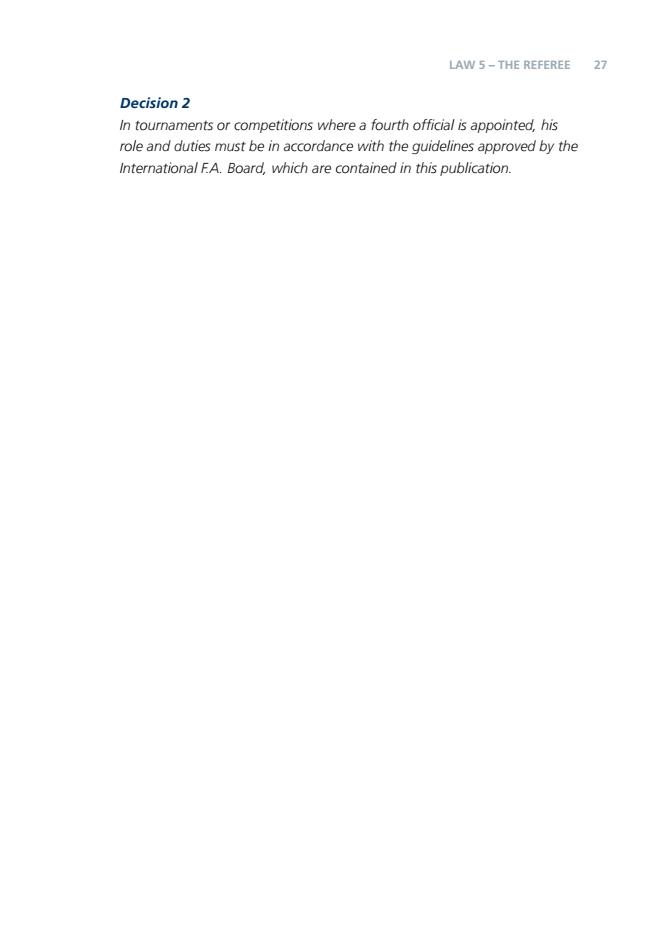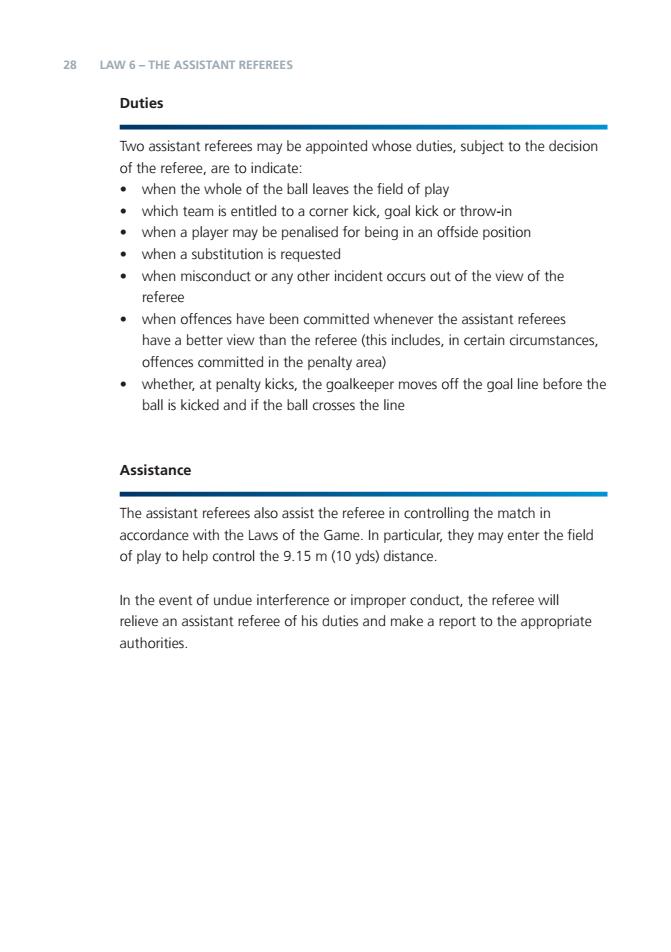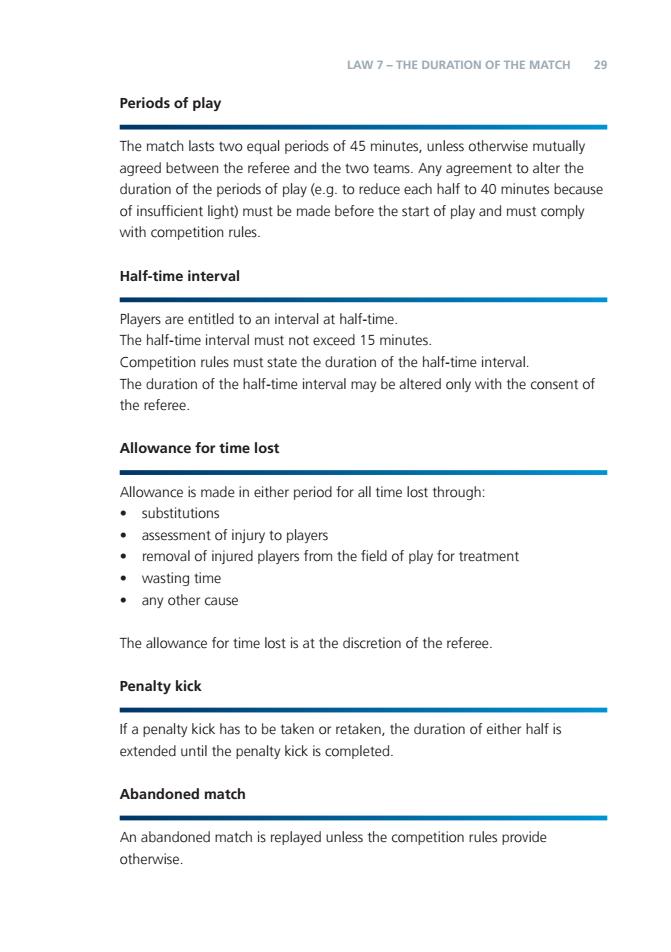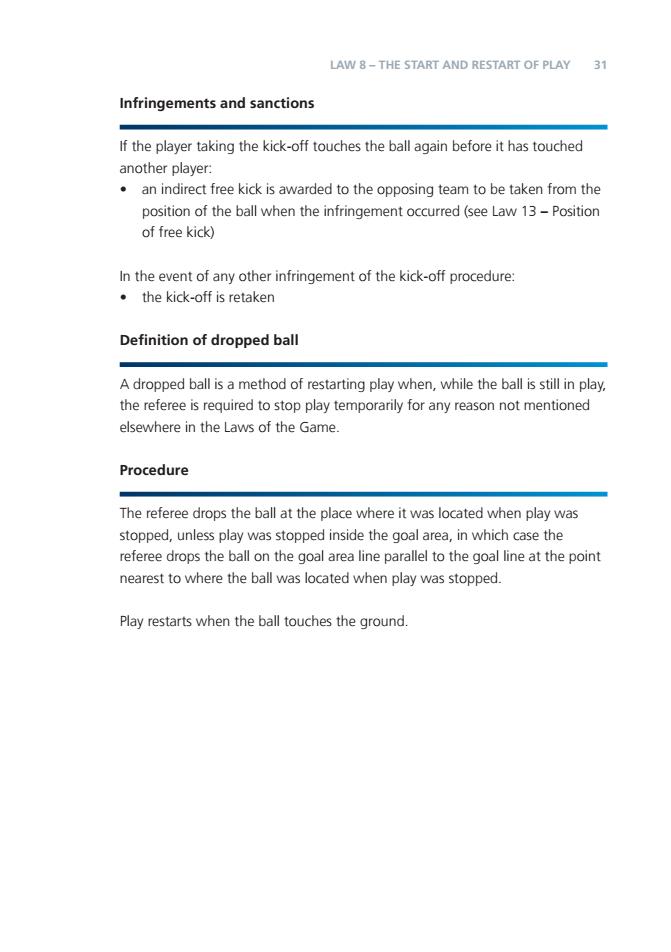
LAW 5-THE REFEREE 27 Decision 2 In tournaments or competitions where a fourth official is appointed,his role and duties must be in accordance with the guidelines approved by the International FA.Board,which are contained in this publication
LAW 5 – THE REFEREE 27 Decision 2 In tournaments or competitions where a fourth offi cial is appointed, his role and duties must be in accordance with the guidelines approved by the International F.A. Board, which are contained in this publication

28 LAW 6-THE ASSISTANT REFEREES Duties Two assistant referees may be appointed whose duties,subject to the decision of the referee,are to indicate: when the whole of the ball leaves the field of play which team is entitled to a corner kick,goal kick or throw-in when a player may be penalised for being in an offside position when a substitution is requested when misconduct or any other incident occurs out of the view of the referee when offences have been committed whenever the assistant referees have a better view than the referee(this includes,in certain circumstances, offences committed in the penalty area) whether,at penalty kicks,the goalkeeper moves off the goal line before the ball is kicked and if the ball crosses the line Assistance The assistant referees also assist the referee in controlling the match in accordance with the Laws of the Game.In particular,they may enter the field of play to help control the 9.15 m (10 yds)distance. In the event of undue interference or improper conduct,the referee will relieve an assistant referee of his duties and make a report to the appropriate authorities
28 LAW 6 – THE ASSISTANT REFEREES Duties Two assistant referees may be appointed whose duties, subject to the decision of the referee, are to indicate: • when the whole of the ball leaves the fi eld of play • which team is entitled to a corner kick, goal kick or throw-in • when a player may be penalised for being in an offside position • when a substitution is requested • when misconduct or any other incident occurs out of the view of the referee • when offences have been committed whenever the assistant referees have a better view than the referee (this includes, in certain circumstances, offences committed in the penalty area) • whether, at penalty kicks, the goalkeeper moves off the goal line before the ball is kicked and if the ball crosses the line Assistance The assistant referees also assist the referee in controlling the match in accordance with the Laws of the Game. In particular, they may enter the fi eld of play to help control the 9.15 m (10 yds) distance. In the event of undue interference or improper conduct, the referee will relieve an assistant referee of his duties and make a report to the appropriate authorities

LAW 7-THE DURATION OF THE MATCH 29 Periods of play The match lasts two equal periods of 45 minutes,unless otherwise mutually agreed between the referee and the two teams.Any agreement to alter the duration of the periods of play(e.g.to reduce each half to 40 minutes because of insufficient light)must be made before the start of play and must comply with competition rules. Half-time interval Players are entitled to an interval at half-time The half-time interval must not exceed 15 minutes. Competition rules must state the duration of the half-time interval. The duration of the half-time interval may be altered only with the consent of the referee. Allowance for time lost Allowance is made in either period for all time lost through: ·substitutions assessment of injury to players removal of injured players from the field of play for treatment wasting time 。any other cause The allowance for time lost is at the discretion of the referee. Penalty kick If a penalty kick has to be taken or retaken,the duration of either half is extended until the penalty kick is completed. Abandoned match An abandoned match is replayed unless the competition rules provide otherwise
LAW 7 – THE DURATION OF THE MATCH 29 Periods of play The match lasts two equal periods of 45 minutes, unless otherwise mutually agreed between the referee and the two teams. Any agreement to alter the duration of the periods of play (e.g. to reduce each half to 40 minutes because of insuffi cient light) must be made before the start of play and must comply with competition rules. Half-time interval Players are entitled to an interval at half-time. The half-time interval must not exceed 15 minutes. Competition rules must state the duration of the half-time interval. The duration of the half-time interval may be altered only with the consent of the referee. Allowance for time lost Allowance is made in either period for all time lost through: • substitutions • assessment of injury to players • removal of injured players from the fi eld of play for treatment • wasting time • any other cause The allowance for time lost is at the discretion of the referee. Penalty kick If a penalty kick has to be taken or retaken, the duration of either half is extended until the penalty kick is completed. Abandoned match An abandoned match is replayed unless the competition rules provide otherwise

30 LAW 8-THE START AND RESTART OF PLAY Definition of kick-off A kick-off is a way of starting or restarting play: at the start of the match after a goal has been scored at the start of the second half of the match at the start of each period of extra time,where applicable A goal may be scored directly from the kick-off. Procedure Before a kick-off at the start of the match or extra time a coin is tossed and the team that wins the toss decides which goal it will attack in the first half of the match. the other team takes the kick-off to start the match. the team that wins the toss takes the kick-off to start the second half of the match. in the second half of the match,the teams change ends and attack the opposite goals. Kick-off after a team scores a goal,the kick-off is taken by the other team. all players must be in their own half of the field of play the opponents of the team taking the kick-off are at least 9.15 m(10 yds) from the ball until it is in play the ball must be stationary on the centre mark the referee gives a signal the ball is in play when it is kicked and moves forward .the kicker must not touch the ball again until it has touched another player
30 LAW 8 – THE START AND RESTART OF PLAY Defi nition of kick-off A kick-off is a way of starting or restarting play: • at the start of the match • after a goal has been scored • at the start of the second half of the match • at the start of each period of extra time, where applicable A goal may be scored directly from the kick-off. Procedure Before a kick-off at the start of the match or extra time • a coin is tossed and the team that wins the toss decides which goal it will attack in the fi rst half of the match. • the other team takes the kick-off to start the match. • the team that wins the toss takes the kick-off to start the second half of the match. • in the second half of the match, the teams change ends and attack the opposite goals. Kick-off • after a team scores a goal, the kick-off is taken by the other team. • all players must be in their own half of the fi eld of play • the opponents of the team taking the kick-off are at least 9.15 m (10 yds) from the ball until it is in play • the ball must be stationary on the centre mark • the referee gives a signal • the ball is in play when it is kicked and moves forward • the kicker must not touch the ball again until it has touched another player

LAW 8-THE START AND RESTART OF PLAY Infringements and sanctions If the player taking the kick-off touches the ball again before it has touched another player: an indirect free kick is awarded to the opposing team to be taken from the position of the ball when the infringement occurred (see Law 13-Position of free kick) In the event of any other infringement of the kick-off procedure: the kick-off is retaken Definition of dropped ball A dropped ball is a method of restarting play when,while the ball is still in play. the referee is required to stop play temporarily for any reason not mentioned elsewhere in the Laws of the Game. Procedure The referee drops the ball at the place where it was located when play was stopped,unless play was stopped inside the goal area,in which case the referee drops the ball on the goal area line parallel to the goal line at the point nearest to where the ball was located when play was stopped. Play restarts when the ball touches the ground
LAW 8 – THE START AND RESTART OF PLAY 31 Infringements and sanctions If the player taking the kick-off touches the ball again before it has touched another player: • an indirect free kick is awarded to the opposing team to be taken from the position of the ball when the infringement occurred (see Law 13 – Position of free kick) In the event of any other infringement of the kick-off procedure: • the kick-off is retaken Defi nition of dropped ball A dropped ball is a method of restarting play when, while the ball is still in play, the referee is required to stop play temporarily for any reason not mentioned elsewhere in the Laws of the Game. Procedure The referee drops the ball at the place where it was located when play was stopped, unless play was stopped inside the goal area, in which case the referee drops the ball on the goal area line parallel to the goal line at the point nearest to where the ball was located when play was stopped. Play restarts when the ball touches the ground